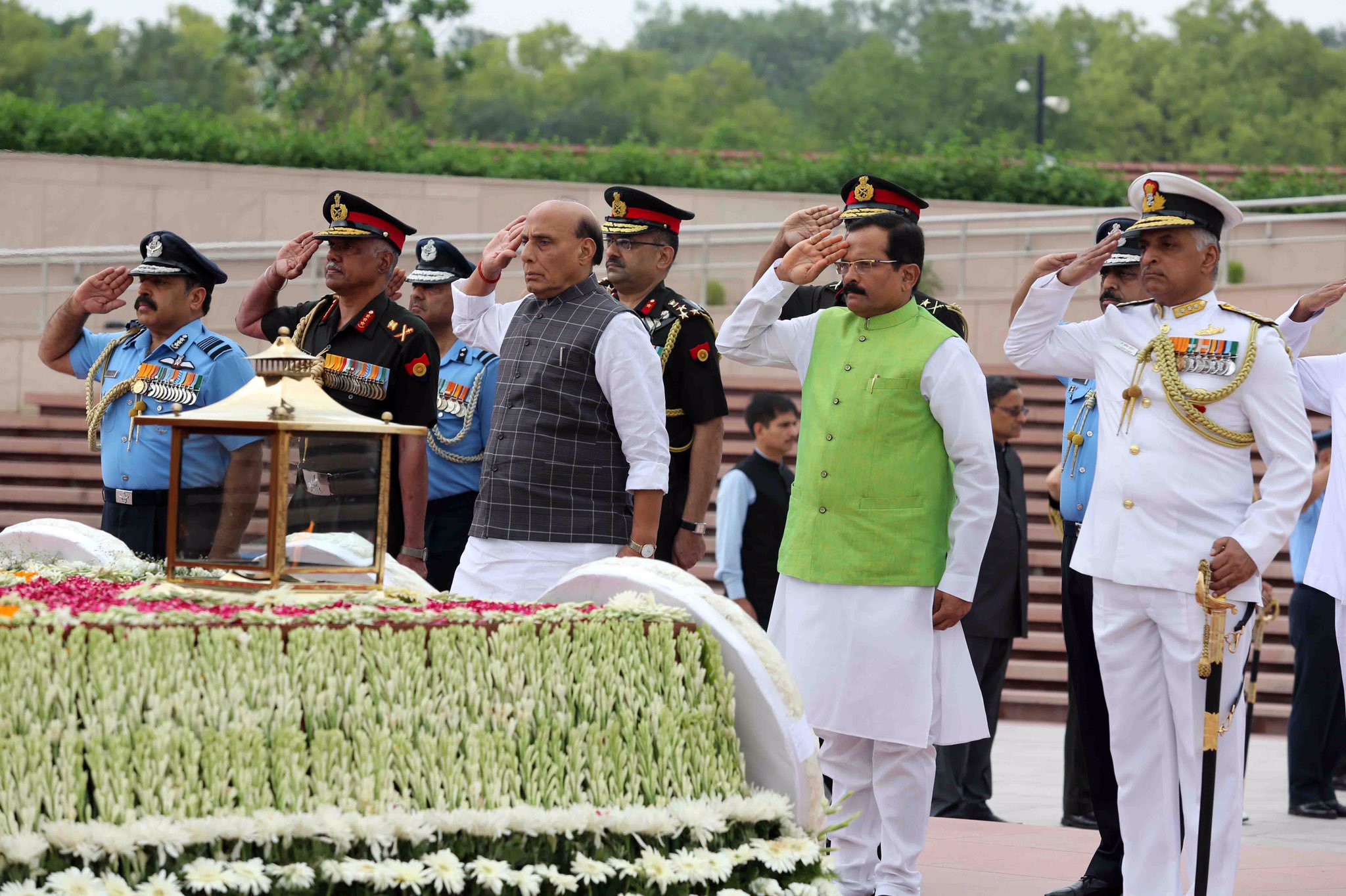


On the occasion of 25th Kargil Vijay Diwas, former Himachal Pradesh Chief Minister Prem Kumar Dhumal shared an emotional memory from his visit to the battlezone with Prime Minister Narendra Modi in 1999. As they distributed essential supplies to wounded soldiers in the hospital, they encountered a soldier who had lost both hands and legs in a mine blast. The soldier's response, stating that the pain had gone since the Indian forces won back Tiger Hill, moved both leaders and showcased the victorious spirit of the Indian soldiers. This experience remains a profound memory for Dhumal, encapsulating PM Modi's mission of hope, solidarity, and tribute to the Indian armed forces.
Prem Kumar Dhumal's Emotional Memory from Kargil Vijay Diwas
On the occasion of the 25th Kargil Vijay Diwas, former Himachal Pradesh Chief Minister Prem Kumar Dhumal shared an emotional memory from his visit to the battlezone with Prime Minister Narendra Modi in 1999.
During the visit, Dhumal and Modi distributed essential supplies to wounded soldiers. They encountered a soldier who had lost both hands and legs in a mine blast. Despite his injuries, the soldier's spirits were high, stating that the pain had subsided since the Indian forces had reclaimed Tiger Hill.
Dhumal was deeply moved by the soldier's resilience and unwavering patriotism. The experience left a lasting impression on him, showcasing the indomitable spirit and sacrifice of the Indian armed forces.
Background
The Kargil War, which took place during May and July 1999, was fought between India and Pakistan in the Kargil district of Kashmir. Pakistani soldiers and militants had infiltrated into Indian territory, seizing strategic positions in the heights of the Kargil sector.
The Indian Army launched Operation Vijay to evict the infiltrators. After intense fighting, the Indian forces regained control of the Kargil heights. The war resulted in the loss of over 500 Indian soldiers and over 1,000 Pakistani soldiers.
Top 5 FAQs and Answers
What was the significance of Prem Kumar Dhumal's visit to the Kargil battlezone?
How did the wounded soldier inspire Dhumal?
What was Operation Vijay?
Who was responsible for the Kargil War?
How many soldiers were lost during the Kargil War?

In a heated verbal exchange, Maratha quota activist Manoj Jarange Patil accused NCP Minister Chhagan Bhujbal of attempting to create a rift between the OBC and Maratha communities for political gain. During a recent OBC rally in Beed, Bhujbal and Dhananjay Munde attacked Jarange, with Pankaja Munde, a BJP OBC leader, watching from the sidelines. Jarange also praised Chief Minister Devendra Fadnavis and Minister Pankaja Munde for staying away from the rally and emphasized the unity of the OBC community. Bhujbal, on the other hand, warned Jarange against challenging the community's rights and vowed to stand up against any attempts to divide them.

On the auspicious occasion of Bhai Dooj, Madhya Pradesh Chief Minister Mohan Yadav transferred a total of 44,900 crore directly into the bank accounts of 1.27 crore women beneficiaries under the Ladli Bahna Yojana. This initiative aims to support and empower women in the state, with each eligible woman set to receive 1,500 per month from November onwards. During the special program at the Chief Minister's residence, Yadav extended his wishes for a happy Bhai Dooj, emphasizing the importance of the brother-sister relationship and the government's commitment towards ensuring the safety and well-being of Ladli Bahnas in the state.

Union Home Minister Amit Shah celebrated the Gujarati New Year and his 62nd birthday in his hometown of Ahmedabad, surrounded by senior political leaders, party members, and well-wishers. Shah's rise in public life through the RSS and his partnership with Prime Minister Narendra Modi have shaped Gujarat's and India's political narrative. His sharp organisational mind, efficient approach, and booth-level political management have been key in building the "Gujarat model" that gave the BJP an enduring edge. Despite transitioning to national politics, Shah's political heart still beats in Ahmedabad, as evident in his New Year celebrations and plans to meet the newly appointed ministers of the Gujarat cabinet.

In a recent incident at the Vasai Fort in Maharashtra, a man dressed as Chhatrapati Shivaji Maharaj got into a heated argument with a security guard over language. The man, who was recording a video, berated the guard for not speaking Marathi and disrespecting the legacy of Shivaji Maharaj. Social media users were divided in their opinions, with some criticizing the man's behavior while others felt the guard needed to be taught a lesson.

In a significant moment for gender equality, President Droupadi Murmu became the first woman to visit the Lord Ayyappa Temple in Sabarimala. Accompanied by her team, she performed Darshan and Puja at the shrine, praying for the well-being and prosperity of her fellow citizens. Her visit symbolized the Supreme Court's decision to lift the ban on menstruating women entering the temple, reminding us that devotion knows no gender barriers.

With early voting just days away, the three major candidates vying to become New York City's next mayor are gearing up for the final debate in what could be their last chance to sway voters. The debate, hosted by Spectrum NY1, The City, and WNYC/Gothamist, will cover issues such as affordability, crime, and the role of former President Donald Trump in the city's politics. With the stakes high and the clock ticking, Democrats Zohran Mamdani and Andrew Cuomo and Republican Curtis Sliwa will need to make a strong case for themselves to secure the future of New York City.

CM Yogi Adityanath's statement about the role of "political Islam" in undermining Sanatan Dharma has sparked controversy and discussion throughout the nation. During an event organized by the Rashtriya Swayamsevak Sangh (RSS), he highlighted the struggles of Indian warriors against political Islam, claiming that this aspect of history is often overlooked. Adityanath's remarks have renewed debates on the representation of India's historical narrative and the impact of colonialism and political Islam.

Samajwadi Party chief Akhilesh Yadav's remarks questioning the government's spending on Diwali celebrations in Ayodhya, and his comparison to Christmas festivities worldwide, have sparked controversy. While the BJP has accused Yadav of being envious of Ayodhya's success, the Vishva Hindu Parishad has criticized him for undermining Indian culture. The comments highlight the tension between political parties over religious and cultural events.

On the occasion of Home Minister Amit Shah's 60th birthday, Maharashtra CM Devendra Fadnavis wished him with a special message on Twitter, calling him the "Chanakya of Indian politics." Fadnavis praised Shah's political acumen and leadership, stating that his contribution to the nation remains unmatched. PM Narendra Modi also conveyed his greetings, commending Shah's dedication to public service and national security. Leaders across India, including former Tamil Nadu CM Edappadi K Palaniswami, extended their wishes and praised Shah's steadfast leadership and tireless dedication.

On Home Minister Amit Shah's birthday, Prime Minister Narendra Modi took to social media to convey his wishes and praise his efforts towards improving India's internal security. Modi highlighted Shah's dedication to public service and hardworking nature, which has earned him admiration from across the country.